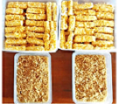Chicken floss and catfish nuggets supplementary to increasing weight gain in stunted children

Downloads
Background: Stunted children are not only less tall, but most of them are also underweight. Lack of nutritional intake, especially protein intake, is suspected as one of the factors. Shredded chicken and catfish nuggets have high protein, but the scientific evidence for these food supplements in increasing stunting children's weight is still limited.
Objective: To determine the effectiveness of supplementation chicken floss and catfish nuggets to increase weight gain in stunted children.
Methods: This is a quasi-experimental with a pretest-posttest design; as many as 70 stunted children with underweight participated in this study. Respondents were given supplementation for 14 days. Respondents' weight was monitored before and after. Data were analyzed by pair t-test.
Results: The results of the hedonic test of 30 panelists said that 27 (90%) stated that they received chicken floss, and 28 (90.33%) received catfish nuggets. There was an increase in the average stunting toddler weight after the given supplementation, which was 0.534 kg, (p<0.0001).
Conclusion: Chicken floss and catfish nuggets supplements can increase weight gain in stunted children.Authors retain copyright and grant the journal right of first publication with the work simultaneously licensed under a Creative Commons Attribution-NonCommercial 4.0 International License that allows others to share the work with an acknowledgement of the work's authorship and initial publication in this journal.
Authors are able to enter into separate, additional contractual arrangements for the non-exclusive distribution of the journal's published version of the work (e.g., post it to an institutional repository or publish it in a book), with an acknowledgement of its initial publication in this journal.
Authors are permitted and encouraged to post their work online (e.g., in institutional repositories or on their website) prior to and during the submission process, as it can lead to productive exchanges, as well as earlier and greater citation of published work (See The Effect of Open Access).

This work is licensed under a Creative Commons Attribution-NonCommercial 4.0 International License.











